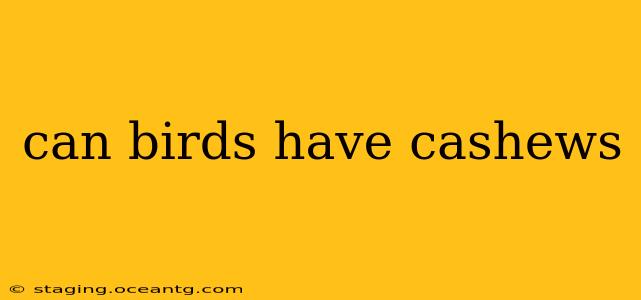Cashews are a delicious and nutritious snack for humans, but can our feathered friends enjoy them too? The short answer is: it's complicated. While cashews aren't inherently toxic to birds, they shouldn't be a regular part of their diet, and there are several important considerations to keep in mind. This guide will delve into the details, answering common questions and helping you make informed decisions about your bird's diet.
Are Cashews Safe for Birds?
Cashews themselves aren't poisonous to birds. However, they are high in fat and salt, which can be detrimental to a bird's health if consumed in large quantities. Too much fat can lead to obesity, liver problems, and other health issues. Excessive salt can disrupt their electrolyte balance and cause dehydration. Furthermore, the preparation of cashews often involves added sugars and seasonings which are definitely harmful to birds.
What Happens if a Bird Eats a Cashew?
A single cashew probably won't cause immediate harm to a healthy, adult bird. However, regular consumption or large quantities can lead to problems like:
- Obesity: The high fat content contributes to weight gain.
- Digestive issues: Cashews can be difficult to digest for some birds, potentially leading to upset stomachs or diarrhea.
- Liver problems: Excessive fat intake stresses the liver.
- Nutrient deficiencies: A diet overly reliant on cashews lacks the essential nutrients a bird needs for a balanced diet.
Can Parrots Eat Cashews?
Parrots, like other birds, can technically eat a small amount of cashew, but it shouldn't be a regular part of their diet. Their specific dietary needs vary greatly depending on the species, size, and age. Always consult with an avian veterinarian before introducing any new foods, especially those high in fat like cashews.
Are Roasted Cashews Okay for Birds?
No. Roasted cashews often contain added salt, sugar, and other seasonings that are toxic to birds. Even unsalted roasted cashews should be avoided due to their higher fat content compared to raw cashews.
What Nuts Are Safe for Birds?
Instead of cashews, offer your bird small amounts of these healthier nut options:
- Almonds (unsalted, unroasted): A good source of protein and healthy fats, but still should be given in moderation.
- Walnuts (unsalted, unroasted): Similar to almonds, but again, moderation is key.
- Pecans (unsalted, unroasted): Another good option, provided they're unsalted and unroasted.
Remember, variety is crucial in a bird's diet. A balanced diet consisting of seeds, fruits, vegetables, and occasional small amounts of nuts is the best approach to ensure your bird’s health and well-being. Always consult with an avian veterinarian for specific dietary recommendations for your bird.
What are the best foods to feed my bird?
This will depend heavily on your bird species. A balanced diet will include a high-quality seed mix formulated for your specific type of bird, fresh fruits and vegetables (ensure they are safe for birds; some are toxic), and occasional small treats. Again, an avian vet is your best resource to create a proper nutritional plan.
My bird ate a cashew, should I be worried?
If your bird consumed a single cashew, it is unlikely to cause any serious harm, especially if it's a healthy, adult bird. However, monitor your bird for any signs of digestive upset, such as diarrhea, vomiting, or lethargy. If you notice any unusual behavior, consult an avian veterinarian immediately. Preventing future cashew consumption is key.
This information is for general knowledge and shouldn't replace professional veterinary advice. Always consult with an avian veterinarian to create a safe and balanced diet for your bird. Their health and well-being are paramount.
